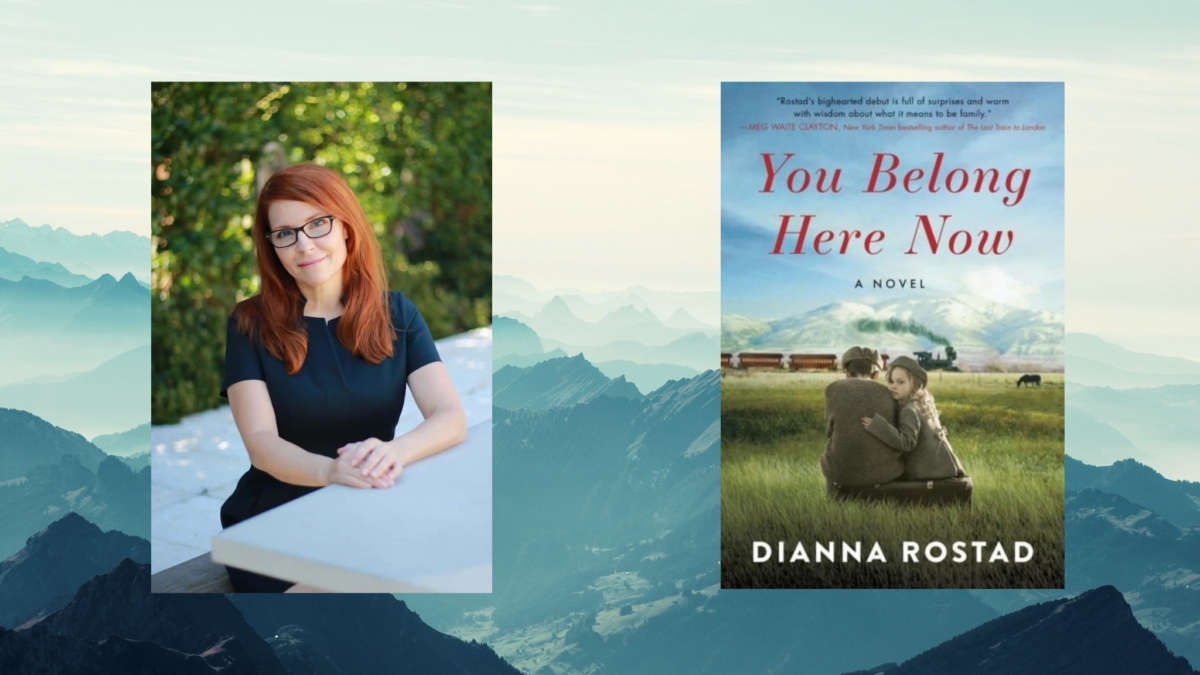Ever since I read Christina Baker Kline’s Orphan Train I was struck by the stories of the orphans sent from New York to the wild Midwest. Now Dianna Rostad, my former critique partner and dearest friend with whom I celebrated with lemon cake, cried at seafood dinner, and hiked over the Big Sur, has illuminated this forgotten history with an unflinching tale of a female rancher and three orphans. This novel has captured the hearts of the writers I admire — for instance, William Kent Krueger guarantees that “you won’t find a finer debut work anywhere.” So as soon as I finished reading her novel, I called her. This is the conversation I had with Dianna Rostad, the author of You Belong Here Now (oh well, part of the conversation).
Q: Dianna, what an accomplishment! You’ve written a novel that touches many readers’ hearts. Could you tell them how long it took for you to write You Belong Here Now?
A: Off and on, it took about thirteen years to get it into the hands of a publisher. You and I know this process well, having spent many years helping each other perfect the craft. I look at a book like a child and for a child, you need a village to raise it. Nobody writes a great novel without a lot of help, feedback, and input, so thank you for all of yours throughout the years.
Q: Thirteen years is a long time. Congratulations on your perseverance. I’m curious to know – why orphans?
A: I worked with youthful offenders after the riots of the 1990s in South Central Los Angeles. It was my job to get them employed when they were paroled. I worked with them on soft skills inside the state Youth Authority and took them around to find work after they were paroled. It doesn’t take much for an orphan to take to an adult who will care for them and provide them with structure, solid boundaries and love.
Q: The descriptive passages in your novel are brutally brilliant; the gritty scene of saving a calf, the wildness of barren Montana where the wind whips you and your tears just pour out, the breakneck farm work and more! Did you get these ideas through research?
A: Yes, for sure. But the voices, stories, legends and songs in the book come from my family. My father helped me by reading for me and gave me a list of Montana writers he liked. I also went to Montana to sniff the air, walk through the grass and take in the landscape. Bringing nature into my novels is very important to me. You’ll see that the wind is a character in my book. For ranching, I went to the Cowgirl Hall of Fame to see a photographic exhibit called “Hard Twist,” by Barbara Van Cleve, and also picked up her book there. The pictures of all these ranch women told of life out in the mud, pulling calves and managing herds of stock — and all from the perspective of women across the Western US.
Q: You’ve successfully created a brusque spinster in the character Nara, a capable rancher, who’d rather be defined by her ability rather than femininity but her stubborn father dismisses her precisely because of that. Where did you get the inspiration for Nara?
A: Nara started out as the namesake of my maternal grandmother, Nara, but quickly morphed into my eldest daughter, Jessica, who was happy to confront anyone she disagreed with. She was a natural-born leader and all about following the rules. The book is dedicated to her, who I lost to cancer during the writing of this book. She was a great help in reading the book and talking over the storyline, and particularly the ending. The moments of completing and publishing this book have helped me stay close to her during my loneliest moments, missing her.
Q: I’m so sorry for your loss, Dianna. Is there anything else you’d like to highlight?
A: More than anything, I want readers to know that my book is about how there’s room for everyone and everything. Whether you’re a female who wants to be a rancher in 1925 Montana, a boy raised on the streets of Hell’s Kitchen who dreams of becoming a cowboy, an Irish boy who longs for acceptance into American society or a Cheyenne man who busts his butt to rise beyond the poverty of the reservation, my book is filled with the faith that all these people and creatures can live side by side in kindness and respect under our Big Sky.
Thank you for talking to me, Dianna. We’ll talk more over dinner next time! Congratulations again on your achievement!
https://booktrib.com/wp-content/uploads/2021/08/BookTrib-Dianna-Rostad.jpg
About Dianna Rostad:
Dianna Rostad was born and raised in the Pacific Northwest. Her parents and extended family come from the ranches of Montana and the farms of Arkansas. Dianna raised three kind, human beings, and when they began to test their wings, she took to writing with a passion, completing Southern Methodist University Writer’s Path program in 2009. A favorite task of her creative endeavors is the discovery and research of people and places where her novels are set. She has traveled extensively to pursue the last artifacts of our shared history and breathe life, truth, and hope into her novels. Now living in Florida, Dianna continues to write big-hearted novels for wide audiences everywhere.




